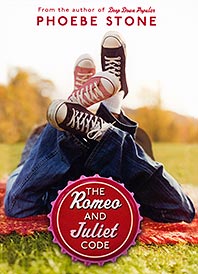 I admit that the cover of Phoebe Stone's Romeo and Juliet Code baffles me; the modern day sneakers have absolutely nothing to do with this story of a British refugee staying with her distant relatives in Maine. But I have a fondness for WWII stories, so I started to get into the story of the ever-so-English girl adjusting to life without her parents and with her quirky Maine family. But little things kept niggling at me.
I admit that the cover of Phoebe Stone's Romeo and Juliet Code baffles me; the modern day sneakers have absolutely nothing to do with this story of a British refugee staying with her distant relatives in Maine. But I have a fondness for WWII stories, so I started to get into the story of the ever-so-English girl adjusting to life without her parents and with her quirky Maine family. But little things kept niggling at me.
First, the twee sound of Felicity/Fliss's voice. I'm sure there really were English kids who constantly said "ever so" and other huge sign posts so nobody forgot they were British, but they tend not to appear in the British books about World War II that I read. Also, she immediately gets a crush on the only local boy, Derek, and I find crushes ever so terribly boring. But in spite of all this the book moves along well, with a touch of mystery as the kids try to figure out the secrets the adults keep and meanwhile Fliss finds that she now has a real family, unlike when she lived with her parents who of course neglected her because her mother worked.
But the end really bugged me. I can accept that Felicity expected all the adults to keep secrets from her; after all, no one even told her in even the vaguest terms why her parents never wrote, so of course she didn't bear a grudge about this even though I did. But the final secret, the one that made Felicity radiant with joy that she truly belongs in the family, was one that I would expect most kids to receive with a bit of ambivalence -- her uncle is her biological father. When Fliss receives this news with unmitigated delight, I lost all respect for her. And I guess now we are supposed to hope that her parents get killed in action, so that there's no awkward moment when she has to go back to living with her mother and her dad? Or maybe since Fliss is also the kind of kid who had no objection to this new family saddling her with the nickname Flissy this sort of emotional confusion would be beyond her depth.
This book is already overdue, so I can't offer it to my kids. I suspect they'd like it more than I did, though.
1 comment:
This one missed the mark for me too, for most of the same reasons. And I'd had such high hopes! Sigh.
Post a Comment